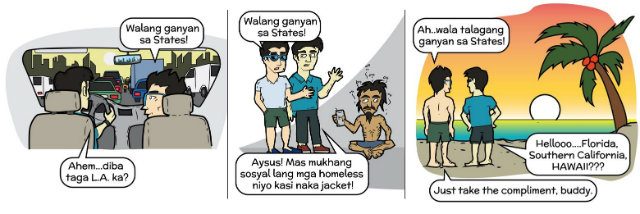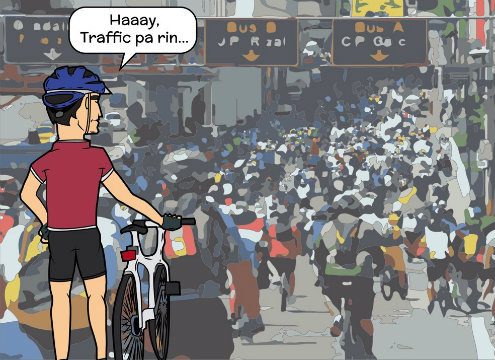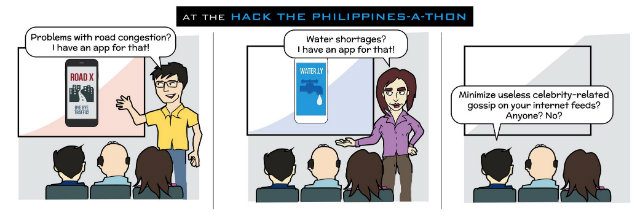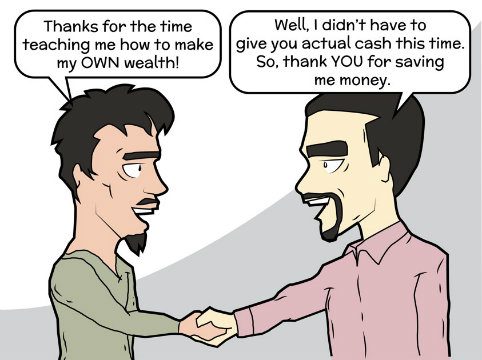SUMMARY
This is AI generated summarization, which may have errors. For context, always refer to the full article.

Singapore has just celebrated its golden jubilee, and this place sure has a lot to show for in its 50 years of nation building. With all its accomplishments as one of the richest, most globally competitive nations in the world, the “Singapore story” has certainly become one of the Philippines’ favorite models for success – at least based on what I’ve been reading online.
The lessons we can learn from the Lion City have been written about extensively and referenced by influential voices in the media and political spheres.
It’s true we can learn a lot from Singapore’s examples of good governance, long-term foresight, pragmatism, and its emphasis on meritocracy and innovation, all executed through strong political will and a relatively united populace.
Superficial yardstick?
But are most of us Filipinos taking the fundamentals of this nation state’s success simply at face value, merely by marveling at their astounding economic figures, admiring their shiny skyscrapers and highly manicured urban landscapes, and witnessing (even experiencing through the eyes of our own overseas workers) their great quality of living?
In other words, are we using the Singapore example as a yardstick for success a little too superficially?
The truth is many of us Filipinos tend to suffer from “country envy.” We love comparing the state of our nation with what’s working well in other countries, mostly in the 1st world.
In our recent 20th century history we’ve modeled our political and economic institutions from what we’ve learned from our American colonizers, so much so that the American-style democracy we’ve continuously adhered to has failed us time and time again (Exhibit A: just examine all the election results in the past). And don’t forget the popular term our balikbayans from the United States have coined: “Walang ganyan sa States.”

American culture has also pervaded most aspects of our day-to-day lives so much so that the English-speaking world has recognized 40 Philippine English words and put them smack into the Oxford Dictionary. (Beat that Singlish!)
More recent events has shown us other examples of the Philippines adapting some 1st world ideas, from short-term exercises such as propagating more bicycle lanes in main city thoroughfares (which actually did not push through), to large-scale long-term urban projects such as Manila Bay’s Casino Complex (watch out Marina Bay and Sentosa!).

-
Agriculture – A sector that’s more technologically equipped, employed by more highly skilled and self-sufficient farmers that actually reap the profits of their own harvest.

- Technopreneurship – A growing sector of entrepreneurs using their business acumen and technological knowhow to alleviate problems unique to the Philippines.

-
The Arts and Media – A robust and well-funded creative industry that tell meaningful stories unique to the Filipino experience executed so expertly that they trend across video-on-demand streams worldwide, such as Netflix or Amazon Instant Video. (I really think we are on the right track with films such as “On The Job”)
-
Small Enterprises – Traditional small enterprises, from mom & pop shops to family-run neighborhood restaurants, empowered by the reach and efficiency of technology, allowing them to effectively serve a wider range of customers.

-
Interclass Cooperation: The rich and poor working together to alleviate pressing social problems such as poverty, homelessness, and crime, constituting a continuous feedback loop of insight and expertise from both sides.

(This “solution” was inspired by this wonderful book, “Genius of the Poor” by Thomas Graham)
- Education: An education system that’s increasingly putting more emphasis on science and technology, enabling future innovators to create solutions specific to the country’s challenges. (i.e. we need more homegrown companies like Solar Philippines, who’s trying to use new tech to solve old problems)
Those are some examples I can think of for now. But the gist is pretty much: assess our own unique circumstances (both the past and the current), leverage on our own competitive advantages (like our natural resources and our people), and most importantly: GET IT DONE!
But of course, I’m stating the obvious, and hugely understating the complexity of getting things done in the country.
Get the Basics Done Right!
Let’s face it. The Philippines is uniquely the Philippines, and only visions and solutions tailored to our circumstances and deeply-rooted in alleviating the struggles of the majority of the population can truly define our success as a nation.
We are not Singapore, the United States, or (insert name of some progressive eco-friendly Scandinavian country here). We did not experience decades of “benevolent dictatorship” as Singaporeans have. We did not develop a robust economic and cultural machine as the Americans have, coming from the struggles of World War II all the way through their dominance in the later part of the 20th century. Nor did we historically build our government based on pragmatism and transparency as the Nordic countries have.
So in essence, we can’t just simply replicate what our first world counterparts are doing.
Like most OFWs, I get my impressions on what’s happening back home through what see in mass media. And based on what I’ve been seeing and reading, the “progress” that the Philippines is going through is still frustratingly inadequate.
Not just because we see a lack of trying at home (and I know there’s a lot of capable people busting their butts to get things done to achieve the more important things), but also the efforts we generally see are falling short of contributing to “true progress”.
There are a lot of lessons we can learn from the first world counterparts of course, but we should look deep into how we can truly apply them to our own context. But our decision makers keep focusing on the superficial stuff. Those brand spanking new casinos in Manila Bay or those one-day bike days on EDSA aren’t enough to bring the country forward.
There are the basics we still need to focus on: decreasing income inequality, eliminating corruption from our institutions, improving public transportation, managing overpopulation especially in our urban centers, and of course getting FAST AND RELIABLE INTERNET, to name a few.
Addressing these fundamental problems now can definitely help lead us to that “Bisyon 2030” I just outlined (hopefully we can do it much sooner that 2030).
And only after getting those done can we go blow off our money on some hard-earned, shiny stuff for the country. – Rappler.com
Eric is an advertising professional based in Singapore that writes and doodles in his spare time about technology, business and entrepreneurship, world issues, popular culture and other nerdy stuff he finds interesting, which he hopes you’ll find interesting too! So, check out his blog at Humid Monkey and get your newsfeeds bombarded with more content by liking the Facebook page.
Add a comment
How does this make you feel?
There are no comments yet. Add your comment to start the conversation.